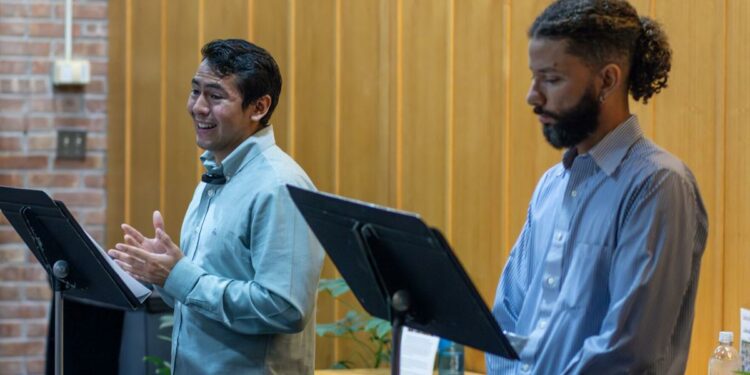As the closing acts of this year’s Hyde Park Jazz Festival resounded on the Midway, a small group of theatergoers gathered in the foyer of Augustana Lutheran Church for a staged reading of Fran Zell’s latest work-in-progress, “My Name is Renny Edward Milano Salgado.” The reading was the third and final on Zell’s mini-tour of the South Side, which also stopped at Second Unitarian and Beverly Unitarian churches the week before.
Born out of her volunteer work with Venezuelan immigrants at the South Side’s 3rd District Police Station and, more recently, with Coppin Community Center’s La Tiendita, Zell follows the story of a single Venezuelan man, tracing the contours of South American political topography, cartel-owned coyote guides and U.S. ICE lockups along the way. Focusing on the real-life story of Milano, who is one of almost 47,000 asylum seekers and refugees that have arrived in Chicago since August 2022, Zell is after a historically-grounded taste of the experience of crossing borders in America.
Relayed through translators who captured the unique cadence and poetry of Milano’s speech, Zell’s play divides the character of Milano into two: a younger English-speaking Milano (Freddy Mauricio) enduring his emigration largely alone and an older Spanish-speaking Milano (Renny Milano) reflecting on his memories. The real-life Milano plays that older self on stage. The contrast of Mauricio’s expressive delivery of the injustices experienced and Milano’s interjected Spanish backstory create a vibrant narrative texture that enhances a feeling of contrived immediacy. You can see Milano’s self visually, linguistically and psychologically divided, coming into being through the threat of its dissolution.
Arising out of her encounters with Milano and other migrants in Hyde Park, Zell relays how involved Milano was in the writing process: it was his idea to play himself, including the living body who experienced a severe border crossing in the narrative account of that crossing. Over the course of weeks of interviews, Zell slowly began to piece together Milano’s story – his daughters a continent away, his single grandmother left to die alone in Venezuela and the violences he faced along the multi-month journey.
In the post-performance Q&A, Zell was surprised to hear more stories from Milano about his crossing, momentary relationships and encounters with strangers who strengthened his resolve. Zell’s writing strips down the narrative into matter-of-fact sentences, relaying the story of trauma as directly and neatly as possible, filling out a few historical gaps along the way.
An audience member translated and helped Milano field questions. Attendees were especially eager to ask Milano about his life, and less about the lightly fictionalized version of events created in the shared space of the Augustana atrium. How is your family? Who helped you along the way? How did you navigate the housing voucher system in Chicago? Milano’s relatives, who had made the journey just a few months ago, were in attendance with their newborn baby girl, Hannah, who patiently waited to be born until they had taken the infamous “La Bestia” – also known as the “Death Train”– through Mexico and made it over the U.S. border.
Beginning with Milano’s childhood, pitted against the rise of Maduro and fascist violence in Venezuela, the play tracks the brutal repression of the Venezuelan student movements in the late 2010s, including the murder of Milano’s fellow activists. Between starting a cigarette arbitrage business, starving himself to save for bus fare, bartering for free medicine for his traveling companions, and getting deported halfway back to Venezuela, Milano describes his travels directly, with the emotions locked up within the words and the horrors themselves. What more could there be to add?
While the human, political and psychological challenges Milano faced in his crossing were formidable, the play emphasizes his resolve, his even temper and his hopeful detachment. His story is one of the few of the survivors – the ones who did not succumb to murderous Texans, cartel chasing bandits, the arid heat of the desert, frigid ICE holding cells, or falling off “La Bestia” while clinging to the roof of a railcar.
And even in his everyday cadence, Milano’s language comes through in its idiomatic poetry: he describes desperation in terms of “need having the face of a dog” and interjects his grandmother’s plight with the metaphor that “the elderly don’t learn how to speak” (both rough, literal translations of the Spanish). His humor and resolve carry through the production: after the performance, he recounted a Donald Trump joke he would use to raise funds for his transport, telling Mexican drivers that so long as they gave him money, it couldn’t go to build Trump’s wall. But at its core, stories like Milano’s serve as a jolting reminder of the difficulty required to even make it to Chicago, the only sanctuary city Milano knew when coming to the United States.
A little more than a year after it opened, Hyde Park’s migrant shelter is getting phased out by the city in the weeks to come. As the city continues to navigate the logistical challenges and social tensions of an influx of refugees and asylum seekers, Zell’s play begins to break down the barrier between migrant and Chicagoan stories: the fact of grief, and the life that resumes around it, cannot be avoided.
Source link : http://www.bing.com/news/apiclick.aspx?ref=FexRss&aid=&tid=66fb77d8d7234eff9c95140e1d03c2b7&url=https%3A%2F%2Fwww.hpherald.com%2Fevening_digest%2Ffrom-venezuela-to-augustana-hyde-parkers-new-play-follows-international-journey%2Farticle_fdb96e96-7f64-11ef-8ee6-57b247f5f7b9.html&c=14678019208762441537&mkt=en-us
Author :
Publish date : 2024-09-30 07:45:00
Copyright for syndicated content belongs to the linked Source.




